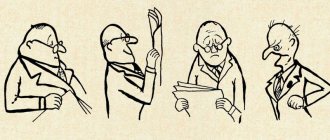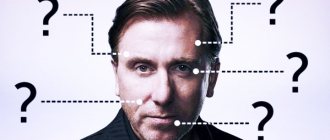Character is a relatively stable combination of psychological traits and personality qualities that are manifested in activity and communication, and characterize typical human behavior patterns. For example, in relation to people he can be sociable or withdrawn, towards the world around him - convinced or unprincipled, towards activities - active or inactive, towards himself - selfish or altruistic.
A person’s character is formed depending on his lifestyle and social environment (upbringing and family, educational institutions, work collective, etc.). It is important which social group is more preferable to a person. Character is closely related to temperament. But temperament is unchanged, it is fixed genetically, and character can be formed throughout a person’s life. Depending on the situation, for example, during rush hour, people behave differently: some calmly endure the crush in the subway, while others are quite noticeably nervous, some react calmly to a remark, while others get into a fight. It depends on the type of temperament and character of the person.
The typology of character and personality was studied by many both domestic and foreign prominent psychologists and psychiatrists: E. Kretschmer, K. Leonard, A. Lichko, D. Casey, N. Obozov, A. Gannushkin, etc. Research has shown that a person’s character has its variability: when this or that trait is on the border of the norm, then we are dealing with accentuation.
Character traits
As already mentioned, distims are more focused on the negative. They manage to get upset and feel sad even when joyful events occur in their lives.
At the very least, they only notice what can upset them. Happiness passes by them as if in transit, without lingering in memories at all.
They are characterized by slow thinking and reactions to various stimuli. Before saying anything, they take a long pause, collecting their thoughts and thinking through every word. They do not actively participate in conversations; they mostly listen silently, occasionally inserting remarks and comments.
A child of the dysthymic type is easy to identify; he is usually unconfident, timid and fearful. He is rarely seen playing, which is accompanied by loud laughter.
Usually he concentrates on collecting construction sets and mosaics and refuses to participate in competitions and other group meetings.
He prefers loneliness, it’s calmer and safer for him, and it gives him the opportunity to reflect on some sad aspects of life, while no one distracts him with conversations.
Schizoid type
Like other premorbid personality types according to Lichko, it is characterized by an increased risk of transformation into psychopathy. Included in Lichko’s typology of character accentuations as a variant of the clinical norm. But often this accentuation turns into a personality disorder. Schizoids are characterized by a group of properties.
Closedness. As a rule, a schizoid is a modern hermit. People with such accentuation do not know how to build close relationships. Most often, they do not want to, since the characteristics of mental activity are directed inward to the individual. The external attributes of life, be it relationships, work, interest them much less. If you're interested at all.
Rich inner world. However, the schizoid does not allow anyone there. Occasionally, only the closest people - friends or partner - receive such an honor.
Reluctance to establish social contacts. It is not only inability, but also reluctance that makes a schizoid who he is. Patients of this kind are excellent at establishing distant, business-like relationships, where everything is defined by role. For example, a teacher-student or an employee-boss. In other, average and especially close relationships, serious problems arise.
Lack of empathy. People with schizoid character accentuation lack understanding of the emotions of others. They also do not understand hidden gestures and the hidden meaning of what is said. Therefore, problems arise in personal life and informal communication. A schizoid prefers to be told about everything directly, without hints.
Developed intelligence. Quite often, but not always. Allows you to work productively in a variety of fields, be it science or other types of activity. Schizoids often achieve success in the field of art and artistic activity.
Thinking outside the box.
Schizoids are rather closed people. However, they are distinguished by loyalty and devotion. Non-standard thinking and, as a rule, a high level of intelligence.
Professional activity
They are excellent workers, only on the condition that they are not given strict time frames and demand quick results. They are able to perform painstaking and monotonous work, which not everyone will undertake, carefully checking all the details and nuances.
Responsible and executive. You can certainly rely on distims; if they have agreed to solve some problem, they will not abandon it halfway through. And they keep their words.
Frequent interactions with other people cause tension and stress, which has an extremely negative impact on their well-being and productivity. Therefore, it is better to choose a profession that is not related to communication and making responsible decisions.
This psychotype has a highly developed sense of justice. He will not steal, put the company and employees in danger, and violate boundaries that are established even unspoken.
Occupying a leadership position, he receives recognition from his subordinates, who can safely count on his conscientiousness and tact.
In case of any failures, he is inclined to blame himself, despite the fact that he was completely unable to influence some events.
Force majeure situations can lead him to a nervous breakdown, since he is completely incapable of coping with difficulties and quickly finding the most optimal ways to solve problems.
Therefore, at a moment of stress, he does not think about what to do to correct mistakes, but completely surrenders to the process of self-flagellation.
Accentuations of character from the point of view of A. E. Lichko
According to Lichko’s theory, accentuation is temporary changes in character. may appear and disappear as the child develops These changes and personality traits sometimes develop into psychopathy and persist into adulthood.
The direction of development of sharpened personality traits is determined by the social environment and the type of accentuation. It can be obvious and hidden .
According to psychiatrist A. Lichko, accentuations are borderline states between normality and pathology .
Therefore, he built his classification on the basis of types of psychopathy.
How does schizophrenia manifest in adolescents? Read about it here.
Character accentuations - examples:
Dysthymic disorder
The danger of this type of character accentuation is that it can lead oneself to a mental disorder called dysthymia with gloomy thoughts and focusing only on the negative.
This is depression, only in a lighter format. It just lasts longer than usual. Therefore, it is recommended that it be treated by qualified specialists without expecting that the condition will improve on its own.
The danger of dysthymia is that it can begin in adolescence and last about two years.
Therefore, usually the patient themselves and their loved ones simply come to the conclusion that the warning signs of the disorder are just character traits and perceive them as a given, which they simply need to come to terms with.
Here's another reason why it's so important to see a doctor when the first symptoms of dysthymia appear. A psychotherapist or psychiatrist will be able to diagnose the presence or absence of a disorder.
Signs
The following symptoms may bother you for two or even three years in a row. Moments of improvement are quite likely, but they are short-term and last approximately 10 to 14 days.
- The attitude towards the future is extremely negative, while the past is remembered with trepidation. It is idealized, although at that moment the person did not feel the value of what was happening. It is acquired over time, as nostalgia.
- The ability to concentrate is reduced, attention is scattered, and a person is simply unable to hold it or control it.
- A low level of energy, accordingly, performance decreases; you don’t want to get out of bed in the morning or move in general.
- Insomnia, nightmares.
- Changes in appetite, most often it increases, as a person with this disorder seeks to enjoy life, replacing feelings of anxiety and hopelessness with food. But there are situations with refusal of food. It all depends on how she is used to reacting to stressful situations and coping with tension.
- Lack of sexual desire, low excitability.
- Self-esteem becomes critically low. A person is unable to rely on his resources and capabilities; he does not believe that he is capable of anything.
- Loss of satisfaction from activities that previously brought joy. That is, he feels indifference to his favorite hobbies and even close people.
Treatment
Dysthymia is usually treated with psychotherapy as well as medications prescribed by a psychiatrist.
Usually these are antidepressants in order to normalize mood and return the patient to the opportunity to experience the full range of feelings and sensations, in addition to sadness, hopelessness and sadness.
It is important to diagnose the presence of secondary mental illnesses that arose as a result of the development of this disorder.
For example, social phobia, panic attacks, addiction to alcohol, nicotine and other psychoactive substances that the patient uses to improve his emotional state may appear.
Being moody for several years is quite a difficult experience. This is why there are often attempts to commit suicide in order to get rid of suffering.
In severe cases, we can talk about “double depression”, this is when dysthymia occurs with repeated depressive states.
Diagnostics
As part of the diagnosis, psychopathological testing is carried out, which allows us to determine the severity of mental abnormalities - the presence of character accentuations described by Lichko, or psychopathy, neurotic and psychopath-like disorders. Psychopathy is a character anomaly that completely determines an individual’s behavior, is not subject to change throughout life, and impedes social adaptation.
To make a diagnosis of psychopathy, it is necessary to have criteria - totality (the influence of a pathological trait on all emotional and volitional reactions), stability, the severity of pathological character traits that provoke social maladjustment. Pathological traits manifest themselves during communicative interactions in the family, school and work groups, and circle of friends.
Regardless of the environmental conditions, a hyperthymic personality shows energy and activity, a schizoid personality isolates itself from the world, a hysterical personality attracts attention to itself by all means. When they talk about an accentuated personality, we are talking about borderline variants of the norm, and not about pathology. In an accentuated personality, pathological traits do not appear in every situation.
Sometimes character accentuations remain in latent form until a certain moment and are revealed in certain situational conditions, for example, during an extreme situation or during the process of passing the Lichko test. Another feature of accentuation is the absence of obstacles to social adaptation, which makes it possible to differentiate small deviations from psychopathy.
As part of the diagnosis of character accentuation, questionnaires developed by Lichko are used. The main task when interviewing a respondent in person is to establish trusting contact. The doctor interviews relatives, friends, and people from the immediate environment to get a reliable idea of the patient’s behavioral patterns.
If it is difficult to establish communication with the interviewee, a technique is used when the doctor himself reports information received from parents, colleagues and other people from the patient’s environment. Then the patient is asked to correct inaccuracies, supplement information, comment on information, and explain contradictions. To identify psychopathy and character accentuation in adolescents, methods developed by Lichko are used. The patient is interviewed in the form of a casual conversation.
The survey often begins with questions about the patient’s physical condition (well-being, mood). At the same time, the doctor observes the behavior of the respondent. The questionnaire was developed by Lichko in 1976. The questionnaire is a set of grouped phrases that reflect the attitude of representatives of different psychotypes to current life problems of various types. Main topics and questions:
- Own assessment of vital functions (well-being, appetite, ability to work, sleep, prevailing emotional background, mood).
- Attitude to close people (parents, other family members, friends).
- Attitude towards others (colleagues, acquaintances, neighbors).
- Attitude to abstract categories (the future, critical remarks addressed to oneself, generally accepted norms, rules, laws, material values, adventures and risky activities, self-care).
When answering the questions, the respondent selects 1 of several answer options. You are allowed to refuse to answer several sets of phrases. In the next questionnaire, you need to exclude the answers that are least suitable. Research shows that diagnostic accuracy using pathopsychological tests is about 85%.
Recommendations
- Dysthymic individuals should lead a healthy lifestyle. That is, watch your diet, do exercises, spend a lot of time in the fresh air and completely give up nicotine and other substances that cause addiction.
- Stop seclusion in order to indulge in despondency, which is typical for this psychotype. Try to find the strength to communicate with other people, otherwise you will distance yourself so much that later it will be very difficult to join the social life that is boiling around at such a moment.
- Look for reasons to laugh and be happy. Play the game, trying to find as many positive reasons for a situation as possible. For example, if it rains, then think of why it is good and not bad if you don’t like it.
- If your loved one belongs to this character accentuation, praise him as often as possible. This will help raise his self-esteem and, possibly, his mood.
Characteristic
The technique of psychiatrist A.E. Lichko highlights character accentuations that indicate disharmonious personality development. The character structure of such people is dominated by certain personal qualities. These properties are clearly expressed and determine the behavioral reactions of the individual and influence social adaptation.
Accentuation according to Lichko indicates a borderline state of personality, which is at an intermediate level between mentally healthy people and patients with diagnosed mental disorders. In most cases, the development of pathological properties of an individual is associated with the negative influence of the external environment.
Lichko’s classification of character accentuations assumes the influence of upbringing characteristics on personality development. For example, hypoprotection (lack of education, complete indifference to the child) underlies the increased severity of manifestations in unstable and conformist personality types, identified according to Lichko’s classification.
Overprotection often aggravates the severity of manifestations in individuals with a hyperthymic, sensitive, psychasthenic constitutional predisposition of the psyche. Emotional rejection causes increased manifestations in people of a sensitive psychotype. Abuse in the family leads to worsening signs of schizoid, hysterical, labile accentuation.
Causes of accentuations
The type of accentuation characteristic of a particular person is determined mainly by genetic factors. But its further development and strengthening are determined by all sorts of external reasons, among which the most significant are such factors as:
- Upbringing. Any extremes, be it lack of attention or overprotection, can provoke the development of accentuation.
- The amount of freedom in childhood. This refers to how the child learns, how free or authoritarian the educational process is.
- Barriers in communication. If a teenager experiences problems communicating with peers, this can lead to nervous breakdowns, which cause accentuation.
- Internal disharmony. This could be low self-esteem or an inferiority complex. The more pressure such experiences put on a person, the more pronounced the accentuation of his character becomes.
Also, the intensification and manifestation of hidden character accentuations can be caused by a lack of communication and prolonged exposure to solitude, dissatisfaction of personal needs, various diseases of the central nervous system and chronic illnesses.
Stuck (affectively - stagnant) type.
Positive traits include sociability, high demands on oneself, and the desire for success. However, such people are not very talkative and tend to lecture people around them, so they are called bores. Vulnerable, very jealous, sometimes too self-confident. These people are vindictive and find it difficult to understand others. This type is characterized by a high level of delayed affect - “stuck” on their feelings, thoughts, cannot forget grievances, and is inert in motor skills. Prone to protracted conflicts, clearly defines the circle of enemies and friends. Suspicious, vindictive. Shows great persistence in achieving his goals.
The stuck personality type is characterized by high stability of affect, duration of emotional response, and experiences. An insult to personal interests and dignity, as a rule, is not forgotten for a long time and is never forgiven just like that. In this regard, others often characterize representatives of this type as touchy, vindictive and vindictive people. The duration of the experience is often combined with fantasizing and hatching a plan for revenge on the offender.
3. Cycloid (affectively labile) type.
Leonhard believes that these people are characterized by rapid changes in mood, therefore, when communicating with others, they can quickly change their behavior, sometimes being cheerful and good-natured, sometimes rude and depressed. These are people who are characterized by alternating hyperthymic and dysthymic states, sometimes without visible external reasons.
An important feature of the cyclothymic type is the alternation of hyperthymic and dysthymic states. Such changes are frequent and systematic. In the hyperthymic phase of cyclothymes, joyful events cause not only joyful emotions, but also a thirst for activity and increased activity. In the dysthymic phase, sad events cause them not only grief, but also a state of depression. This state is characterized by slowness of reactions, thinking, and emotional response.











